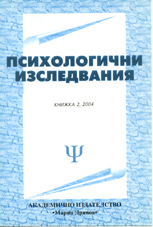ФОНОЛОГИЧНО ЧЕТЕНЕ ПРИ БЪЛГАРСКИ И НЕМСКИ НОРМОЛЕКСИЧНИ И ДИСЛЕКСИЧНИ ДЕЦА
PHONOLOGICAL READING IN BULGARIAN AND GERMAN NORMAL READING AND DYSLEXIC CHILDREN
Author(s): Andrey Popatanasov, Bozhidar Dimitrov, Petra GeorgievaSubject(s): Psychology
Published by: Институт за изследване на населението и човека - Българска академия на науките
Summary/Abstract: This study aimed at the development of phonological processing in children. A set of hierarchically structured tasks was applied with specific control over different kinds of phonological coding (assembled vs. addressed strategies). A sample of 56 Bulgarian children with no reading problems and 22 children with developmental dyslexia was compared to a sample of 55 normal reading and 68 dyslexic German children. They performed 4 tasks: 1) reading non-words; 2) reading regular words; 3) reading texts; 4) reading with phonological transformation. Younger children demonstrated longer reading times and more errors than elder children for all tasks. German dyslexic children were slowest in non-word reading and Bulgarian dyslexic children had most difficulties with the phonological transformation task. Performance data indicated that whole-word reading abilities were developed earlier, thus requiring particular addressed phonological strategies. The improvement in assembled phonological strategies seemed to be of a lesser extent. Dyslexic children showed inefficient assembled phonological coding.
Journal: Психологични изследвания
- Issue Year: 07/2004
- Issue No: 2
- Page Range: 63-72
- Page Count: 10
- Language: Bulgarian

